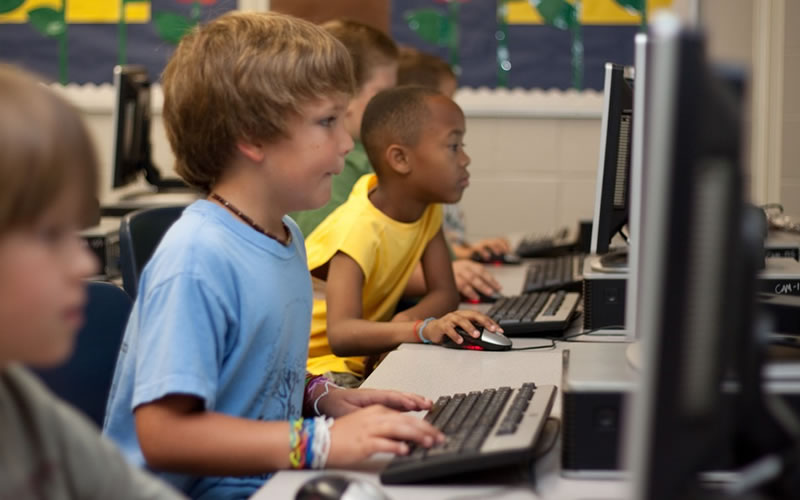
By Lindsay Street, Statehouse correspondent | South Carolina schools struggling to fill open teacher positions have turned to online instruction over the last decade to keep basic classes available to students. But as online instruction seeks more taxpayer funds, some in the state warn the option is a Band-Aid, not a solution to the state’s teacher shortage.
“To think it can replace teachers because we have a teacher shortage is a terrible idea,” S.C. Education Association President Sherry East told Statehouse Report.

Lawmakers are gearing up for a session focused on education with the teacher shortage at the forefront, according to Senate Education Committee member Brad Hutto, D-Orangeburg.
“(Online instruction is) not ideal but is it better than nothing? Is it better than having a substitute? Yes. There is a place in our classrooms with online instruction, but every child deserves a quality teacher in the classroom,” Hutto said. “I wouldn’t say it’s good but I would say it’s acceptable under certain circumstances.”
A temporary solution develops
Online instruction is coordinated through the S.C. Department of Education’s VirtualSC program, which launched in 2006. Two years later, the program was aiding schools with staffing shortages by providing classroom learning labs, which is one of three options it offers schools.
There are currently 41,449 students enrolled in VirtualSC classes who also are enrolled in a brick-and-mortar school. The other two programs rely on a certified teacher inside the classroom.
In the learning labs, each online classroom is taught by a certified teacher employed by VirtualSC, and the school only needs to provide an in-person monitor, who does not need to be certified, according to Office of Virtual Education Director Bradley Mitchell.
“It’s a good, temporary solution, especially for small, rural schools that need to bridge that gap,”
Bradley Mitchell said. VirtualSC only offers high school and some middle school courses.
Right now, there are three schools using virtual learning labs through the education department:
- Dacusville Middle School in Pickens County is offering two high school courses on computer applications and integrated business applications;
- Ridgeview High School in Richland County is offering Latin II; and,
- McCormick High School in McCormick County is offering eight total classes. McCormick recently made news for its use of virtual labs as a stopgap measure for staffing problems.
More than 6,700 teachers left their job in in the 2017-2018 school year, disproportionately affecting small and rural school districts. State education officials and its watchdog say this provides “one tool in the toolbox” toward tackling the problem, which tends to affect small and rural school districts worse.
But online instruction is limited to middle and high school students, so it doesn’t help where the state has its most critical need in the teacher shortage: elementary school, said Education Oversight Committee Executive Director Melanie Barton.
“(With) online, you can’t do 4-year-olds and 5-year-olds. They need a person in teaching reading,” Barton said. “In the early grades, you need the teacher one on one … (This) is where we still have a big issue with the shortage.”
Critics of online instruction also questioned whether small or rural school districts have the infrastructure available to facilitate online learning, but Mitchell said that has become less of an issue at most schools.
“The schools have been great in providing time and space for people to work in their computer labs, and we’re not seeing a whole lot of issues,” Mitchell said.
Program wants to expand
VirtualSC has sought to expand in recent years, but has not received funding from the General Assembly. Mitchell said he would like to add staff to the program to expand it, but the $5 million request has yet to earn legislative approval over the years.

S.C. Sen. Greg Hembree, R-Horry, is positioned to be the next chair of the Senate Education Committee. He said he has been boning up on education issues prior to the start of session, so should he be named chair of that committee he can “hit the ground running.”
“(Online instruction) is no more a silver bullet in addressing the problem. It’s just one tool that has been effective and it can be expanded upon,” Hembree said. He called McCormick High School’s decision to offer so many courses through VirtualSC “wise.” “It’s part of getting to a better place.”
Hembree likened adding $5 million to the program to finding pennies in the couch cushions, given the size of the state budget, which tipped $8 billion this fiscal year.
Hutto said that while the program has been helpful and is a “better alternative” than not having a class, he questions offering an entire course as online.
“We need to pay our teachers more; we need to recruit more teachers by offering incentives for their schooling,” Hutto said. “This online option is a part of the overall picture but a very small part … I don’t want everyone to think this is the wave of the future. That’s not the best way to teach.”
- Have a comment? Send to: feedback@statehousereport.com
















 We Can Do Better, South Carolina!
We Can Do Better, South Carolina!